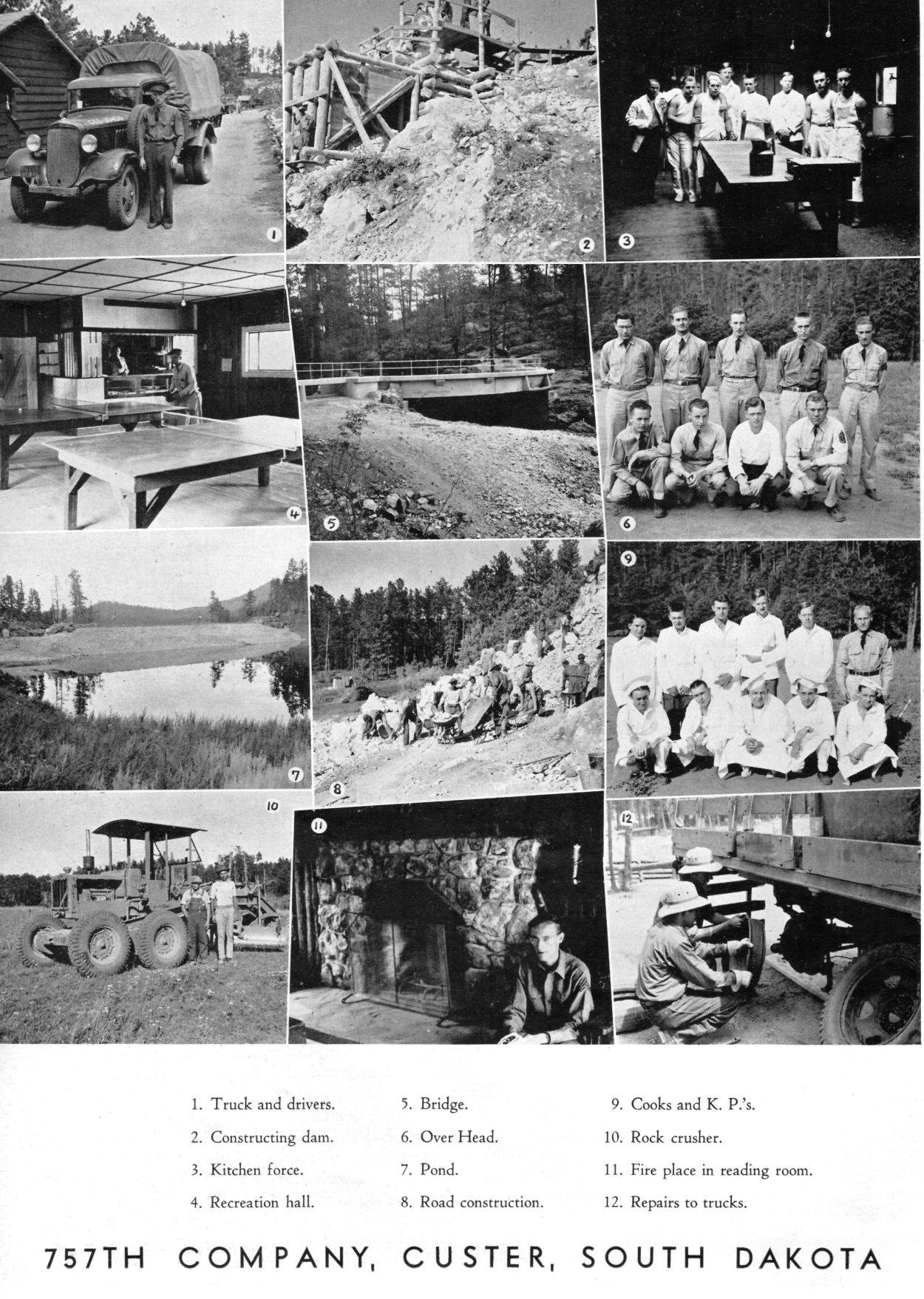CCC Company 757
CIVILIAN CONSERVATION CORPS
Reproduced from the Official 1937 Civilian Conservation Corps Annual, Nebraska - South Dakota District, Seventh Corps Area. Annual was donated to the CCC Museum of South Dakota by Melvin Hermanson.

One of the oldest companies in the United States, was organized at Fort Crook, Nebraska, on May 18, 1933. It has seen service in three states and before it was a month old it started its travels by being assigned to duty in Oregon. Under the command of Major F. G. Ringland, we arrived at Camas where we built Camp Remote among the trees. Here, under the able supervision of the Forest Service, we learned how both to make the forests more safe from fire, and to give the young trees a better chance to grow. Several small forest fires gave us training in the technique of fighting and controlling them. As recreation many interesting excursion trips were made to the Pacific Ocean, Crater Lake, and numerous other scenic points.
After spending the first winter on the coast, we left Camp Remote on April 20, 1934, for Fort Meade, South Dakota, and were at once assigned to Camp Tigerville, near Hill City. At this time new recruits were received and once again the company was brought to standard strength. On July 6, 1934, Lieut. Ericsson joined the company and after serving six months as Junior Officer was promoted to Commanding Officer of the company. Although there have been several other officers with the company since that date, Lieut. Ericsson is still in command. Outstanding among our varied experiences at Tigerville was fire-fighting in "Bloody Gulch," where an unforgettable nineteen hours were spent without rest before the fire was under control. Nevertheless, we had many happy week-ends, many of which were spent in visiting Harney Peak, Wind Cave, Rushmore Monument, and other beautiful places in the Black Hills. We were also privileged to witness the historic stratosphere balloon flight in the summer of 1934.
We had a successful summer in baseball and won the Black Hills trophy for having the best all-round team in the Hills. We anticipate a heavy football schedule and were drilling hard for the season when orders were received to move to Franklin, Nebraska.
After getting settled in Franklin, conservation service, terracing, brush dam construction, tree planting, and general erosion work kept us busy until the middle of January in 1936. During this time we had many interesting experiences, but the Republican River flood in May, 1935, was perhaps the highlight of our stay at Franklin, for a special detachment was sent to Alma, Nebraska, to help fight the water and cooperate in rehabilitation work after the flood.
On January 15, 1936, we were again transferred, this time to Spalding, Nebraska, and here we were greeted by one of the worst snow storms in the history of that section. Because of the severe weather conditions, many of us were somewhat discouraged; however, it did not take us long to make new friends and again enjoy many good times. After being without a Junior Officer for several months, Lieut. Swanson joined the company on July 17, 1936, and has been with us ever since. Upon our leaving Spalding on May 31, 1937, the scene had entirely changed from our arrival almost eighteen months before. The townspeople turned out 100 percent with a band to wish us good-bye and luck in our new home at Summit, South Dakota.
Our return to South Dakota and sojourn at Summit was made memorable by the six inches of snow that fell on June 5th while we billeted in tents. Forestry Supt. K. H. Eldred, a foreman with the company in Tigerville, South Dakota, in 1934, was the new Camp Superintendent. Insufficient water supply necessitated our moving to Camp Doran, Custer, South Dakota, where Lieut. T. E. Kane joined the company as Medical Officer.
Camp Doran is beautifully located, placed as it is near the dam which makes Stockade Lake, a lovely, clear body of water in an idyllic setting of pine-covered hills. Our side camp, established at Ditch Creek, is in the scenic limestone region of the Black Hills. Here, in a pleasant camp and again in the interesting Forest Service work, we hope that our travels are over and that we may be permanently located at Camp Doran.







